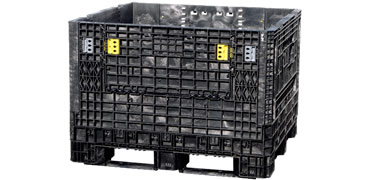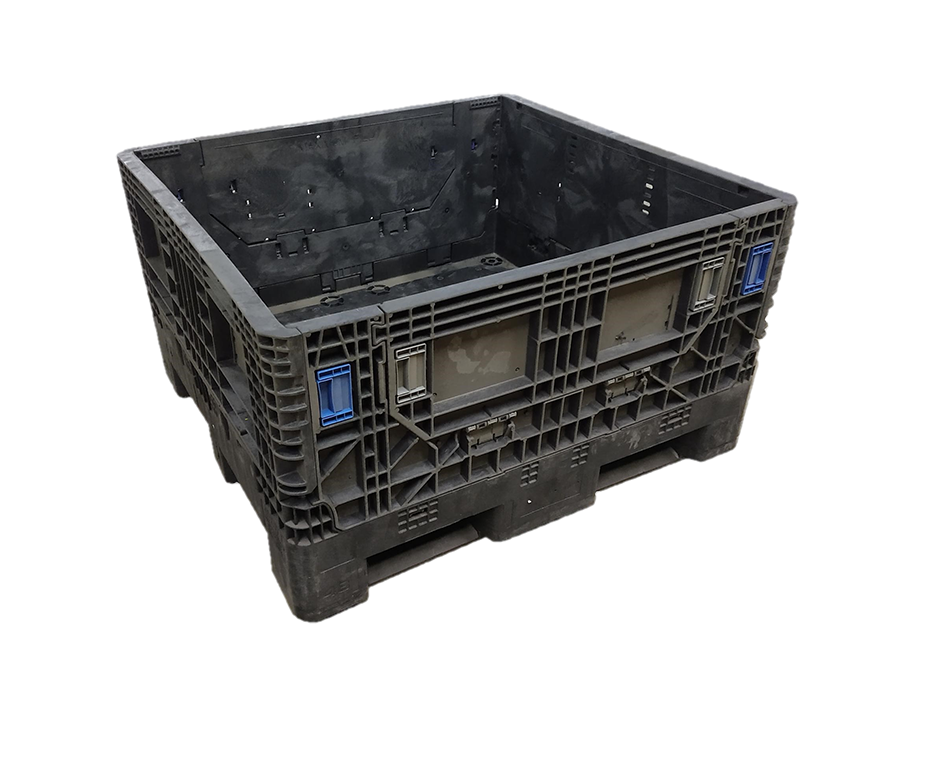Explore efficient storage ideas using refurbished bulk containers in manufacturing
Wiki Article
Why Bulk Containers Are Essential for Sustainable and Economical Transport
Mass containers play an important role in contemporary logistics. They facilitate the effective motion of large amounts of items, therefore maximizing transport processes. This approach not just reduces costs but likewise lessens ecological effect through reduced exhausts and waste generation. As industries seek even more lasting techniques, the fostering of bulk containers is becoming progressively considerable. What implications does this change hold for future logistics and supply chain monitoring?
The Advantages of Making Use Of Bulk Containers in Logistics
Mass containers reinvent logistics by improving efficiency and sustainability. These containers allow for the transport of big quantities of items in a single trip, substantially lowering the number of journeys needed. This not just enhances procedures but likewise decreases labor expenses connected with handling, loading, and discharging. In addition, mass containers are developed to maximize room application within transportation lorries, guaranteeing that even more items can be delivered all at once.The standardization of mass containers also streamlines the logistics process. With uniform dimensions, they can be easily piled and kept, leading to improved warehouse monitoring. In addition, bulk containers often include sturdy materials that secure materials from damage throughout transportation, thereby reducing item loss and boosting total reliability. As an outcome, organizations can experience boosted supply chain efficiency, ultimately causing enhanced earnings and customer contentment. This combination of factors makes mass containers an essential possession in contemporary logistics.
Environmental Influence: Minimizing Waste and Carbon Impact
As sectors increasingly prioritize sustainability, the adoption of bulk containers has arised as a key technique for reducing waste and reducing carbon impacts. These containers decrease using packaging materials, such as boxes and plastic, thus notably reducing total waste generation. By consolidating deliveries, mass containers enhance transportation effectiveness, permitting more products to be transferred per journey. This decrease in journeys directly associates with reduced greenhouse gas discharges, adding to a smaller sized carbon footprint.Moreover, mass containers can typically be reused or reused, further reducing ecological influence. The longevity of these containers assurances they can stand up to multiple transportation cycles, reducing the need for single-use choices. used collapsible containers. By improving logistics and advertising effective resource use, bulk containers not only sustain lasting practices however also encourage industries to straighten with global ecological objectives. Inevitably, their implementation mirrors a dedication to ecological stewardship and accountable source management
Cost Savings: Exactly How Bulk Containers Lower Transportation Costs
While many business look for means to enhance their profits, making use of bulk containers provides a significant opportunity for decreasing transport costs. Bulk containers make best use of the volume of products transported, permitting organizations to deliver larger quantities simultaneously. This efficiency lowers the number of journeys needed, straight decreasing gas expenses and decreasing labor expenses related to loading and dumping.Furthermore, mass containers usually feature structured layouts that enhance area application within transportation vehicles. This suggests fewer voids, bring about extra efficient use available capability. Additionally, the resilience of bulk containers can reduce the danger of product damage during transportation, minimizing losses and making certain that even more products show up undamaged.
Enhancing Supply Chain Efficiency With Bulk Storage Space Solutions
Mass storage solutions play an essential role in improving supply chain performance by enhancing supply management. By combining goods into fewer, larger containers, services can greatly lower managing prices connected with regular transfers and handling. This streamlined approach enables for much better tracking and administration of inventory, eventually resulting in boosted functional performance.Structured Stock Monitoring
Efficient stock management is important for optimizing supply chain procedures, especially when organizations adopt bulk storage space remedies. These services make it possible for services to keep greater supply levels while minimizing the frequency of replenishment. By combining products right into mass containers, firms can simplify their supply procedures, reducing the complexity connected with tracking multiple smaller sized packages. This method facilitates precise stock counts and improves forecasting precision, enabling more educated decision-making. Additionally, bulk storage space remedies simplify warehouse organization, making it easier to situate and gain access to products when needed. Therefore, organizations can achieve a much more reliable supply turn over price, eventually boosting overall supply chain performance and reducing the possibility of stockouts or overstock situations.
Reduced Handling Costs
The implementation of bulk storage space remedies not just improves inventory administration but likewise significantly reduces dealing with expenses throughout get more info the supply chain. By consolidating materials right into bulk containers, business lessen the need for constant handling and transfer between various storage and transport units. This strategy minimizes labor costs associated with loading, discharging, and moving smaller bundles. Additionally, mass storage space reduces the frequency of deliveries, resulting in lower transportation expenses and lowered fuel consumption. Consequently, companies can maximize their logistics operations, permitting a much more efficient allotment of sources. Ultimately, decreased dealing with costs add to boosted overall supply chain performance, cultivating an atmosphere that sustains both sustainability and economic stability.
Flexibility of Bulk Containers Across Various Industries
Although lots of markets have distinct requirements for transport and storage, bulk containers have become a functional option that meets a vast array of demands. These containers, ranging from big containers to specialized containers, can fit diverse products, including granules, powders, and fluids. In the agricultural field, mass containers promote the transport of fertilizers and grains, while the food and drink market uses them for ingredients and completed items. The chemical market relies on bulk containers for safely moving harmful materials, ensuring compliance with safety and security guidelines. Furthermore, building and construction companies take advantage of bulk containers for transporting aggregates and various other materials. Their adaptability includes various settings of transport, consisting of ships, vehicles, and trains, improving logistical performance. This convenience not just streamlines procedures across different markets but likewise promotes sustainability by lowering packaging waste and enhancing room en route. Bulk containers play a necessary role in contemporary supply chain monitoring.Future Fads in Mass Container Use and Sustainability
The future of mass container use is progressively shaped by innovative products growth that improves sustainability. In addition, automation in logistics guarantees to improve procedures, minimizing waste and enhancing efficiency. Embracing round economic situation practices will further transform just how bulk containers are created, used, and recycled, fostering a more sustainable transportation landscape.Ingenious Materials Growth
As sectors progressively prioritize sustainability, innovative products growth wholesale containers becomes a considerable factor in improving eco-friendly transport services. Scientists and makers are checking out biodegradable plastics, recycled composites, and lightweight metals to minimize ecological effect. These materials not just decrease waste but likewise improve gas effectiveness by reducing the total weight of containers. In addition, innovations in wise products, which can adjust to differing conditions, boost the resilience and functionality of bulk containers. The integration of these ingenious products straightens with circular economy concepts, advertising reuse and recycling. As the need for lasting techniques expands, the development of such materials will play an essential function fit the future of mass container usage in logistics and transport.Automation in Logistics
Significant innovations in automation are poised to transform logistics and the application of mass containers, enhancing sustainability in transport. Automated systems, consisting of drones and self-governing automobiles, are streamlining the movement of bulk containers, lowering the dependence on conventional fuel-powered transportation. These technologies optimize directing and packing procedures, reducing vacant miles and improving gas efficiency. Additionally, automated inventory management systems boost tracking and monitoring of bulk containers, ensuring far better source appropriation and decreased waste. The integration of the Web of Things (IoT) permits real-time data analysis, enabling aggressive decision-making that straightens with sustainability goals. As automation remains to advance, it is anticipated to drive better advancements in mass container usage, inevitably sustaining even more sustainable logistics practices and decreasing the ecological influence of transport.Round Economy Practices
Improvements in automation are setting the phase for a much more integrated strategy to round economy techniques in the domain name of bulk container use. As sectors significantly embrace sustainability, mass containers are being made for long life and reusability. This change not only minimizes waste but also improves resource effectiveness. Business are embracing techniques such as closed-loop systems, where made use of containers are gathered, reconditioned, and reintroduced right into the supply chain. Furthermore, smart modern technologies track container life cycles, assisting in much better monitoring and decreasing ecological influence. The cooperation between manufacturers, logistics suppliers, and end-users is necessary in developing standards for lasting container use. used collapsible bulk containers. Future patterns suggest an expanding emphasis on products that are eco-friendly and recyclable, further reinforcing the circular economic climate's concepts wholesale transport
Frequently Asked Concerns
What Products Are Bulk Containers Commonly Made From?
Mass containers are normally constructed from resilient materials such as high-density polyethylene, steel, cardboard, and aluminum. These materials offer stamina, defense, and flexibility, making them appropriate for transporting various goods in different sectors efficiently.Just how Do I Choose the Right Dimension Mass Container?
Selecting the appropriate dimension mass container entails reviewing the quantity of products to be moved, taking into consideration handling equipment compatibility, and assessing storage room needs. Correct dimension guarantees performance in transportation and reduces waste throughout shipment.Are Bulk Containers Reusable or Recyclable?
Bulk containers are often reusable, designed for several trips, enhancing sustainability. Several can additionally be recycled, depending upon the products made use of. Selecting recyclable options even more decreases and supports ecological objectives waste in transportation techniques.What Security Laws Put On Bulk Container Transportation?
Safety policies for mass container transportation consist of conformity with the Department of Transport standards, correct labeling of dangerous products, structural honesty analyses, and adherence to weight limitations to guarantee secure handling and prevent accidents during transportation.Just How Can Services Shift to Using Mass Containers Efficiently?
Organizations can transform to bulk containers by examining current logistics, educating staff on handling, investing in appropriate devices, enhancing stock management, and teaming up with distributors to ensure compatibility and performance throughout the supply chain.
As sectors increasingly focus on sustainability, the adoption of bulk containers has actually arised as a key strategy for lowering waste and decreasing carbon impacts. By settling materials into mass containers, firms can enhance their supply processes, minimizing the intricacy connected with tracking several smaller sized plans. As markets significantly focus on sustainability, ingenious materials advancement in bulk containers emerges as a significant variable in improving green transport solutions. Automated systems, including drones and autonomous cars, are improving the motion of bulk containers, decreasing the reliance on standard fuel-powered transportation. In addition, automated supply administration systems improve tracking and tracking of bulk containers, making certain better resource allowance and lowered waste.
Report this wiki page